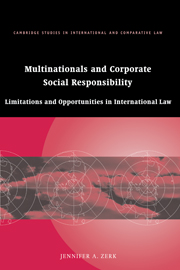 Multinationals and Corporate Social Responsibility
Multinationals and Corporate Social Responsibility Book contents
- Frontmatter
- Contents
- Preface
- Table of treaties, declarations and other international instruments
- Table of cases
- Table of statutes and statutory instruments
- List of abbreviations
- Introduction
- Part I Regulatory issues and problems
- Part II Home state regulation of multinationals
- Part III International regulation of multinationals
- 6 Towards an international law of CSR?
- 7 Multinationals and CSR: limitations and opportunities in international law
- Bibliography
- Index
- CAMBRIDGE STUDIES IN INTERNATIONAL AND COMPARATIVE LAW
7 - Multinationals and CSR: limitations and opportunities in international law
Published online by Cambridge University Press: 23 July 2009
- Frontmatter
- Contents
- Preface
- Table of treaties, declarations and other international instruments
- Table of cases
- Table of statutes and statutory instruments
- List of abbreviations
- Introduction
- Part I Regulatory issues and problems
- Part II Home state regulation of multinationals
- Part III International regulation of multinationals
- 6 Towards an international law of CSR?
- 7 Multinationals and CSR: limitations and opportunities in international law
- Bibliography
- Index
- CAMBRIDGE STUDIES IN INTERNATIONAL AND COMPARATIVE LAW
Summary
Can international law provide a framework for the effective regulation of the health, safety and environmental standards of multinationals on an international scale? This book suggests it can, although clarification is needed on a number of key issues before real progress can be made. First of all, who is primarily responsible for regulating multinationals? It is suggested in the previous chapters that the home states of multinationals have a significant role to play. Lately, home states seem to have become more willing to take this task on, although they have generally shied away from the more ‘binding’ forms of regulation, seeing themselves as facilitators (rather than enforcers) of CSR standards. On the other hand, the few international treaty regimes that have been developed so far to address the conduct of multinationals rely heavily on home state action for their effectiveness, and illustrate the many regulatory possibilities that exist. A second issue that needs clarification concerns the extent to which direct obligations apply to multinationals under international law and how, in practice, these are to be fulfilled. In particular, which of the various components of the multinational enterprise are responsible for ensuring these obligations are met, and on what basis? Although there is growing speculation that some direct obligations may exist, they are still only vaguely defined, and their substance largely speculative.
- Type
- Chapter
- Information
- Multinationals and Corporate Social ResponsibilityLimitations and Opportunities in International Law, pp. 299 - 310Publisher: Cambridge University PressPrint publication year: 2006
